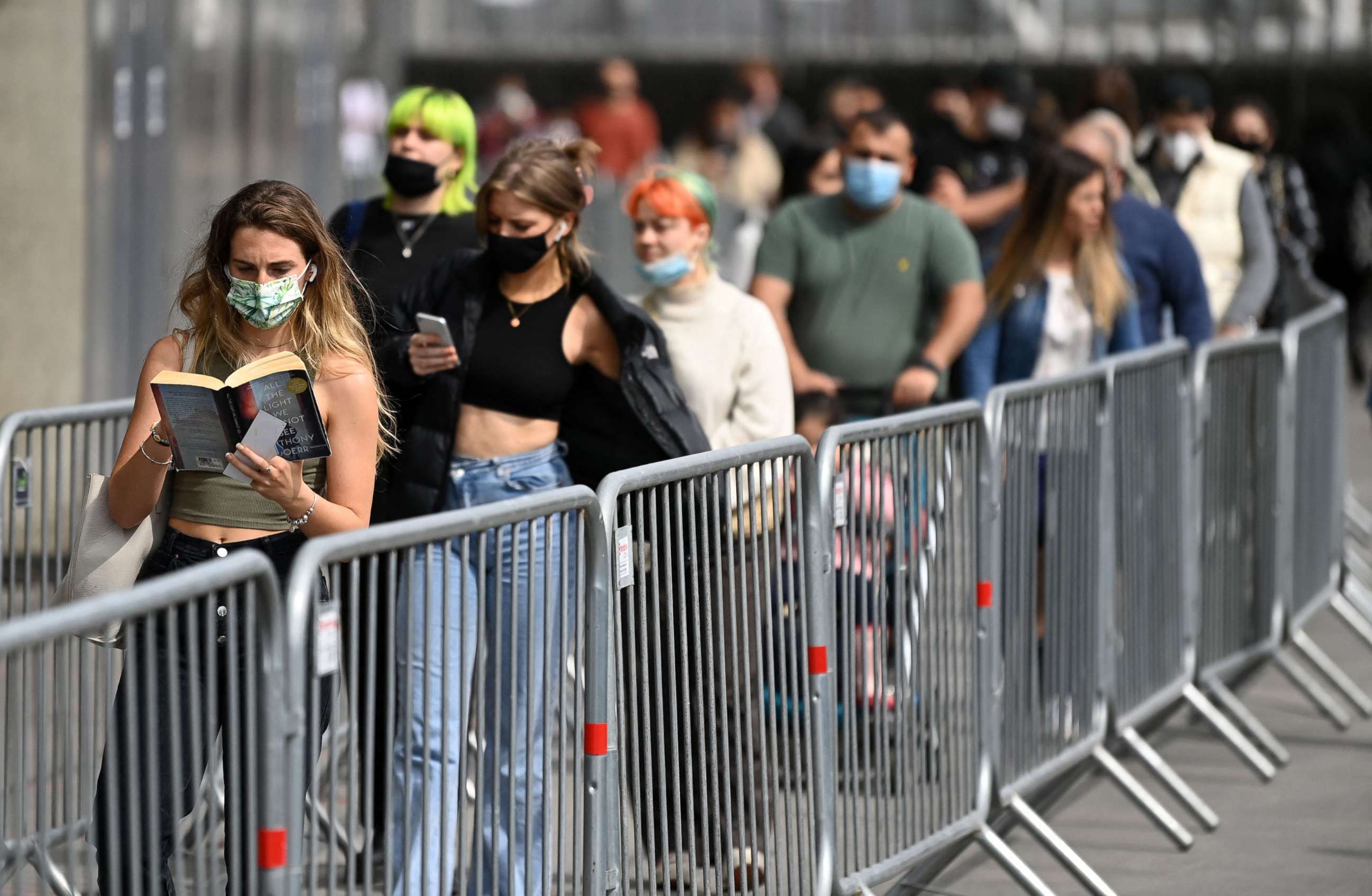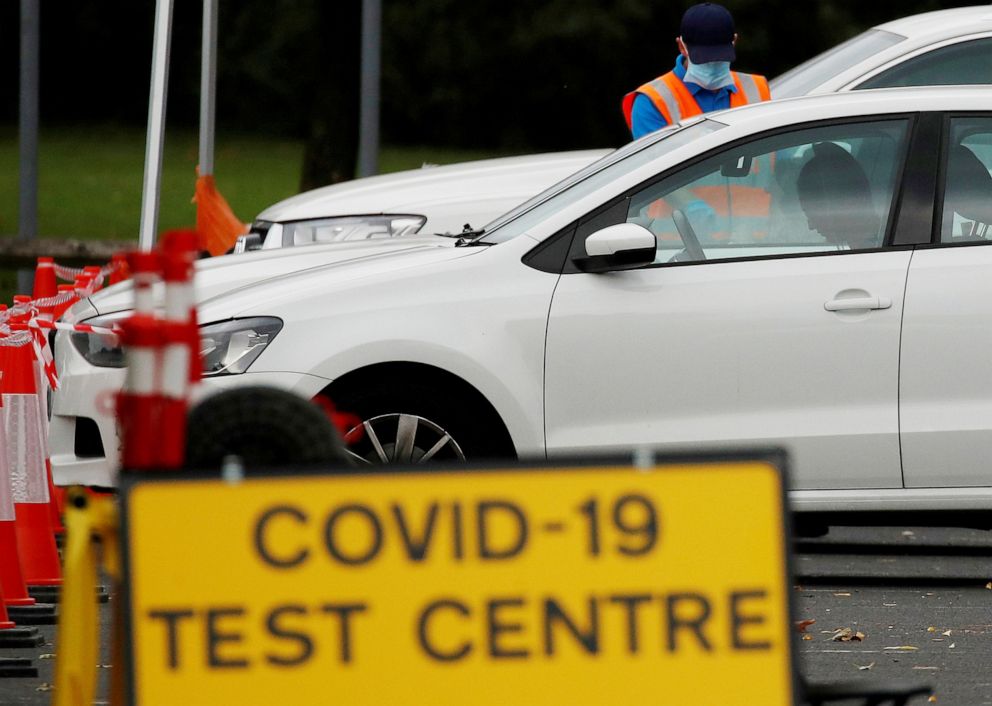Boris Johnson's coronavirus gamble as England set for full reopening
All government mandated restrictions are set to end on July 19.
LONDON -- England, which has faced more than 14 months of lockdowns as the COVID-19 pandemic raged and waned, is set to fully reopen July 19, despite a rising caseload in one of the most vaccinated places in the world.
While the other nations of the U.K. -- Scotland, Wales and Northern Ireland -- are responsible for setting their own restrictions, Prime Minister Boris Johnson has moved forward with the plan to end social distancing in England, having already delayed reopening by a month.
The vulnerable section of the population has been told by the government “follow the same guidance as everyone else,” but they “may wish to think particularly carefully about additional precautions you might wish to continue to take.”
Everyone on the “Shielded Patient List” (some 3.7 million) should have been offered a vaccine, the government said.
As of July 15, 261,832 cases had been recorded in the previous seven days, a 32.6% increase from the previous week. In the seven days preceding July 11, according the latest available data, there were 3,933 hospitalizations – an increase of 46.8% from the week before, according to official government data.
The delta variant, which is more transmissible than the original coronavirus strain, is now responsible for around 95% of new cases in the U.K., according to The Lancet.
Experts warn that the reopening could lead to a surge in cases, but others say that how much they will increase is a question, which is one reason officials say there may be no good time to do it.

'Proceed now with caution'
Ahead of the full reopening, mass events have been held including the European Championships, with tens of thousands attending soccer games in London. Social distancing collapsed during celebrations for England's path to the final.
The relaxation will put an end to limits on social gatherings and mandated mask use, though some businesses and transport authorities have indicated mask use will continue to be mandatory.
The new Health Secretary, Sajid Javid, warned on BBC radio that lifting the restrictions could lead to 100,000 cases a day this summer. However, Javid has said that the success of the vaccine program – which has seen 67.1% of the adult population fully vaccinated – appears to have partially broken the link between cases and hospitalizations.
“When you look at hospitalizations and deaths, deaths, for example, [they are] are one thirtieth of what they were the last time we saw case numbers of that type,” Javid told Sky News this month. Javid announced that he tested positive on Saturday, and will now be isolating, although he said his symptoms were mild and he was fully vaccinated.
Some sections of the British media have dubbed the upcoming date as “Freedom Day.” But Johnson stressed that while restrictions are being lifted, personal responsibility remains. He said that while cases are rising, they are at the “middle range of [government scientists’] projections for infections and at the lower end of their projections for mortality.”
"But it is absolutely vital that we proceed now with caution,” he said earlier this week. “And I cannot say this powerfully or emphatically enough. This pandemic is not over. This disease coronavirus continues to carry risks for you and your family. We cannot simply revert instantly from Monday, the 19th of July to life as it was before COVID. We will stick to our plan to lift legal restrictions and to lift social distancing.”
Several leading doctors co-authored an open letter in The Lancet, warning that that the easing of restrictions is “dangerous and premature.” And the government’s approach contrasts with that of Israel, a similarly vaccinated population, which has moved to reimpose some social distancing restrictions after a rise in cases. At an international summit on Friday, over 1,200 scientists and public health experts backed the letter in The Lancet, warning that the reopening had the potential to allow vaccine resistant variants to emerge that could be exported to the rest of the world.
In an interview with ABC News this week, World Health Organization spokesperson Dr. Margaret Harris warned that “the big numbers” of cases were coming from Europe and the Americas, lamenting the “extraordinary belief in many of you, particularly the north, the northern hemisphere, in the U.S. and in Europe, that somehow it's over.”

Won't disappear any time soon
While the vaccines have partially stemmed the number of hospitalizations and deaths, both long COVID and the possibility of new variants are potential concerns for any government looking to go down the same course, according to David Heymann, a professor of infectious disease epidemiology, London School of Hygiene & Tropical Medicine.
“Well, I think the first thing to understand is that this disease is becoming endemic and when it becomes endemic, that means it circulates in the population on a permanent basis,” according to Heymann.
Fundamentally, that means the epidemiology of the virus is changing in the U.K., with younger people more likely to be infected and hospitalized due to being lower down on the priority list of vaccines, he said.
“Now, people have to learn how to do their own risk assessment as they've learned for other infectious diseases like sexually transmitted infections,” he said. “And they need then to do the proper strategies to protect themselves and to protect others.”
Whatever happens, the novel coronavirus will not disappear anytime soon, even in vaccinated populations, he said.
“It will not end even if there are 70% of the people vaccinated or more or 70% with immunity, it will still have an opportunity to circulate in those populations and it will be reintroduced from time to time. So we're looking at a virus which is establishing itself and many countries are taking different approaches. We just don't know which approach will be best.”
Much will depend on whether the rate of hospitalizations and deaths rise once again to a point where they become intolerable, although the government has yet to provide a number which would provoke new restrictions. For now though, the government appears set on the full reopening of society in England, with the other nations of the U.K. set to chart a more cautious path.
“To those who say ‘why take this step now’ I say ‘if not now, when?" Javid told the U.K. parliament this month. “There will never be a perfect time to take this step because we simply cannot eradicate this virus.”




